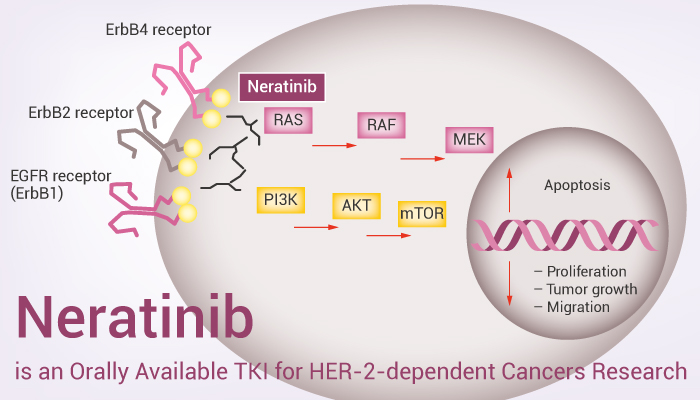The EGFR family of receptor tyrosine kinases (RTK) comprises four distinct receptors: the EGFR (also known as ErbB-1/HER1), ErbB-2 (neu, HER2), ErbB-3 (HER3) and ErbB-4 (HER4). Among them, HER2 is contrary to other members of the ERBB family, HER2 does not directly bind ligand. HER2 activation results from heterodimerization with another ERBB member or by homodimerization when HER2 concentration are high, for instance in cancer. Amplification or over-expression of this oncogene has been shown to play an important role in the development and progression of certain aggressive types of breast cancer.
Neratinib (HKI-272) is a potent, orally active, irreversible, and highly selective HER2 and EGFR inhibitor.
Meanwhile, Neratinib does not significantly inhibit several serine-threonine kinases tested (Akt, cyclin D1/cdk4, cyclin E/cdk2, cyclin B1/cdk1, IKK-2, MK-2, PDK1, c-Raf, and Tpl-2) or the tyrosine kinase, c-met. Neratinib is highly active against HER-2-overexpressing human breast cancer cell lines. In addition, Neratinib inhibits the EGFR kinase and the proliferation of EGFR-dependent cells. Furthermore, Neratinib reduces HER-2 receptor autophosphorylation in cells, most likely by targeting a cysteine residue in the ATP-binding pocket of the receptor. Moreover, Neratinib results in inhibition of downstream signal transduction events and cell cycle regulatory pathways. This leads to arrest at the G1-S (Gap 1/DNA synthesis)-phase transition of the cell division cycle, ultimately resulting in decreased cell proliferation. Besides, in vivo, Neratinib is active in HER-2- and EGFR-dependent tumor xenograft models when dosed orally on a once daily schedule. Thus, Neratinib is an antitumor agent in breast and other HER-2-dependent cancers.
To sum up, Neratinib is an orally active and irreversible HER2 inhibitor, has the potential for breast cancers and other HER-2-dependent cancers research.
References:
[1] Sridhar K Rabindran, et al. Cancer Res. 2004 Jun 1;64(11):3958-65.
